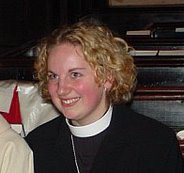Isaiah 40:1-11
Psalm 85:1-2, 8-13
2 Peter 3:8-15a
Mark 1:1-8
“Prepare ye, the way of the Lord, make his paths straight.”
These words have been my facebook status for the past week, along with an invitation into a blessed Advent. The words did not come from a casual glance at the lectionary readings upon which I am preaching, on this, the 2nd Sunday of Advent. But rather they came from a place inside of me that awakens when the season of Advent begins – the “liturgical bone in my body” if you will, that reminds me to pay attention, to keep watch, to remember that a season of preparation has begun.
Doing the groundwork. That’s what we’re supposed to be doing when we say that as a church, as a people, we observe the season of Advent. It’s not just that we are fussy about the color of ribbons we put on our wreaths (though we are – notice the purple ribbons on your ways out – no red until Christmas!) It’s not that we are humbugs by abstaining from offering “Merry Christmases” so early in December – opting for a plea of ‘happy Advent,” to which some politely nod, and then walk away shaking their heads, and it’s not so strange that even at the end of ChristmasVille, a weekend event filled with the fantasy of Santa hats, and gingerbread men, that we invite the community to join us for a service of Advent Lessons and Carols (tonight at 6 p.m.).
What’s important about our traditional season of Advent is that we don’t just jump to the wonder and joy of gifts and goodies intended to be feasted upon on during the twelve days of Christmas: December 25 through January 6th. It’s the fact that we have expectations to fulfill before we get there. We have ground to cover, we have a path to follow – we have work to do. Because no matter how generous we have been, and will be in our gift-giving, cookie-making, and holiday shopping for loved ones, there are still children and adults who will be hungry on December 26th. There are still families, and orphans, who will have to live with the devastating realities of HIV/AIDS and other diseases. There are still those who will mourn, those who will be alone, those who will not know the gift of God’s deep and abiding love. We still have ground to cover. We still have preparations to make. There is more to December than the grand and beautiful celebration that is scheduled to take place at the end of it. There is the season of Advent that reminds us to be about the business of following God’s call, and doing the work of God’s hands in the world around us.
This week I learned the story of a family in
This story teaches me that Advent, and that seasons of preparation in our lives, can happen at any time. But only if we’re paying attention, only if we’re open to hearing God’s call, and saying “Yes, I will follow, I will seek your path, I will look expectantly to a new day, new joys, new possibilities.”
In my own life I am well practiced at this work of listening for God, discerning with God, asking the questions and faithfully responding to the possibility that God might be doing a new thing in me and the communities around me. I have followed God’s call into ministry, to seminary, and to
Prepare the way of the Lord, make his paths straight.
Just as John was called upon to proclaim to the people – I challenge you to hear these words, and mark your Advent journey with their decree:
Prepare ye the way of the Lord.
The season of Advent is here – and we are called to a journey that includes prayer, reflection, listening, and responding to God’s call on our lives. To follow in the path, we must seek it out – we must discern where God is calling us, what new things God is inviting us into as we prepare to celebrate the anniversary of Jesus’ entrance into the world.
What are you doing to make room in your lives for Christ’s invitation to be loved, and love others in response? Though we live in a context that seems incredibly focused on one day of gift-giving, and feasting, we, as Christians are called to open ourselves to the possibility of new life, new light, to resurrection in our own lives, every day that we proclaim Jesus as Lord and Savior.
As we continue in this season of Advent, I invite you into the work of preparation – of making room for the new things that Christ has in store for you, for others whose lives will be touched by yours, and for the whole world that is in need of the gift and hope of resurrection. Amen.
Delivered by The Rev. Mary Catherine Enockson
Sunday, December 7, 2008
The Episcopal Church of Our Saviour, Rock Hill, SC.

